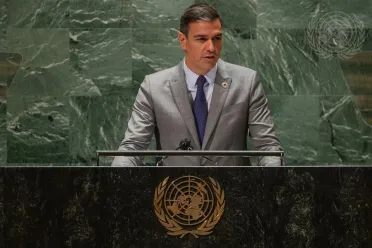Statement
Statement summary
PEDRO SÁNCHEZ PÉREZ-CASTEJÓN, President of Spain, said a recent volcano on the Spanish island of La Palma illustrated how nature reminds us both of our fragility and our strengths. Over the past year-and-a half, the international community believed the whole world was united on the vulnerability of all and efficacy of science in developing vaccine. However, the pandemic also reinforced intolerable inequalities in vulnerable countries, in both health care and the economy. While Spain is filled with hope after vaccinating 75 per cent of its population, there is a “bitter contrast” with those States still at 1 per cent, including Afghanistan.
In the long run, inequality only creates poverty, while fairness benefits all, as no one is safe unless everyone is safe and no borders can defend some from the suffering of others. He noted Spain has increased its vaccine donation to needy countries by 7.5 million doses. Stressing the severity of the situation in Latin America and the Caribbean, with 9 per cent of the world population and 30 per cent of deaths, he added Spain has donated another 7.5 million doses there and 7.5 million for sub-Saharan Africa. The Government is also contributing €2 million to Unitaid and waiving vaccine patents. In a global paradigm shift compared to previous crises, the world is realizing “there is no such thing as a purely national solution”, he said.
Turning to finance, he cited the G20 Debt Service Suspension Initiative and IMF special drawing rights as initiatives all should support, as they can benefit middle-income countries with liquidity problems as well as the most vulnerable States. Noting the climate emergency remains “the overarching crisis of our time”, a common problem with common causes calling for multilateral solutions, he called for honouring the commitments of the Paris Agreement. Spain is allocating €30 million to the adaptation fund in 2022, and at home 40 per cent of recovery spending is allocated for ecological transition.
Addressing global security, he noted Spain’s role in Latin America and the Mediterranean, and the Western Sahara, and hailed United Nations efforts including in Libya, whose stability must be forged by Libyans themselves, including through upcoming elections. He cited a new policy for Africa, committed to returning security and peace to the Sahel, which is essential to security of citizens on both sides of Mediterranean. Middle East peace talks must be resumed towards a two-State solution, and the international community must learn to work with Afghanistan. Spain contributes 25 per cent of European Union forces abroad, including in the Sahel. He noted Spain and the United Kingdom have reached a bilateral understanding regarding Gibraltar, expressing hope for an agreement reached with European Union and United Nations doctrine, recognizing his country’s legal position regarding rights and sovereignty there. The enemy of multilateralism is extremism, he said, so the world must not be deceived by those espousing selfishness and individualism.

